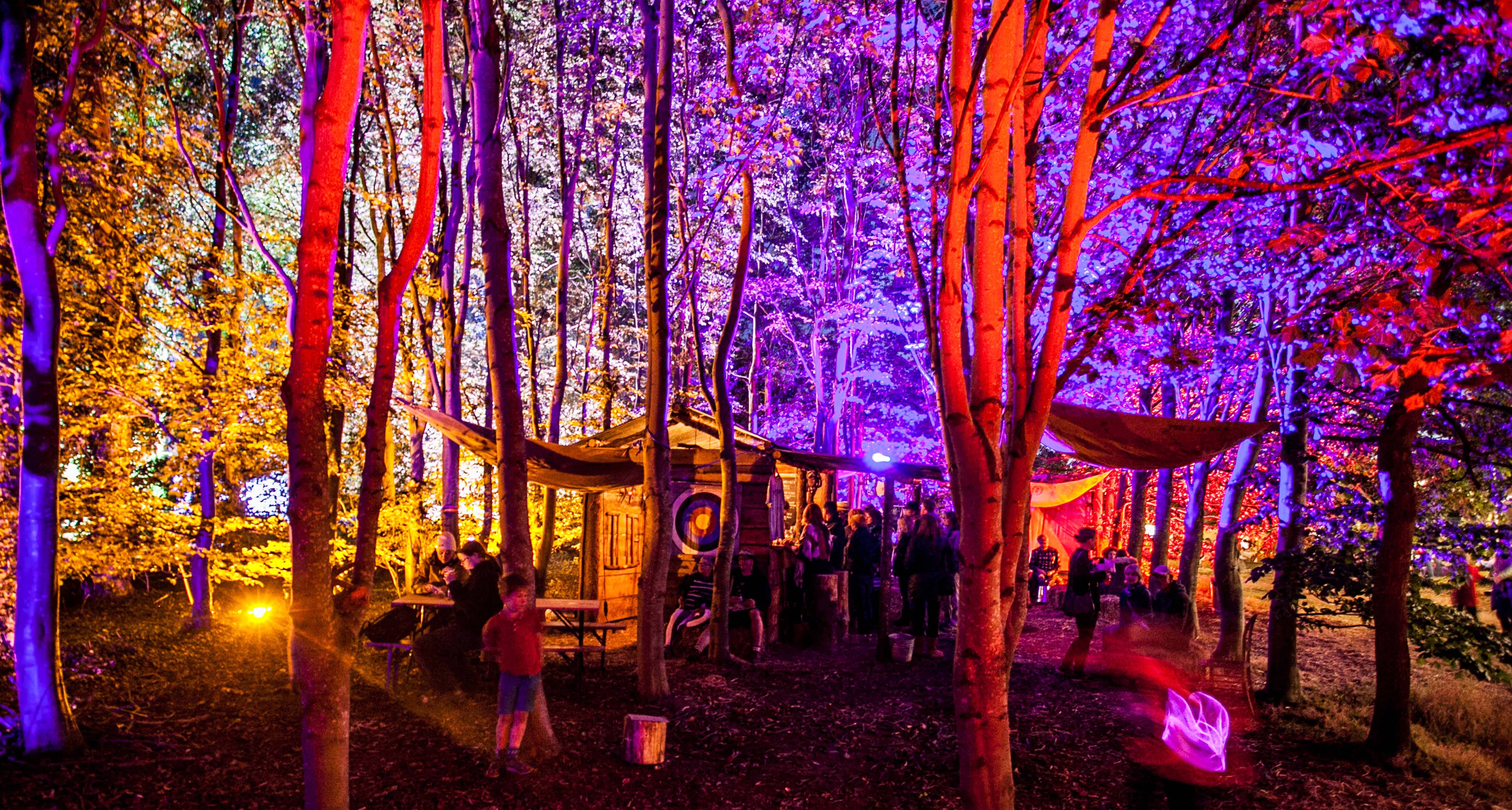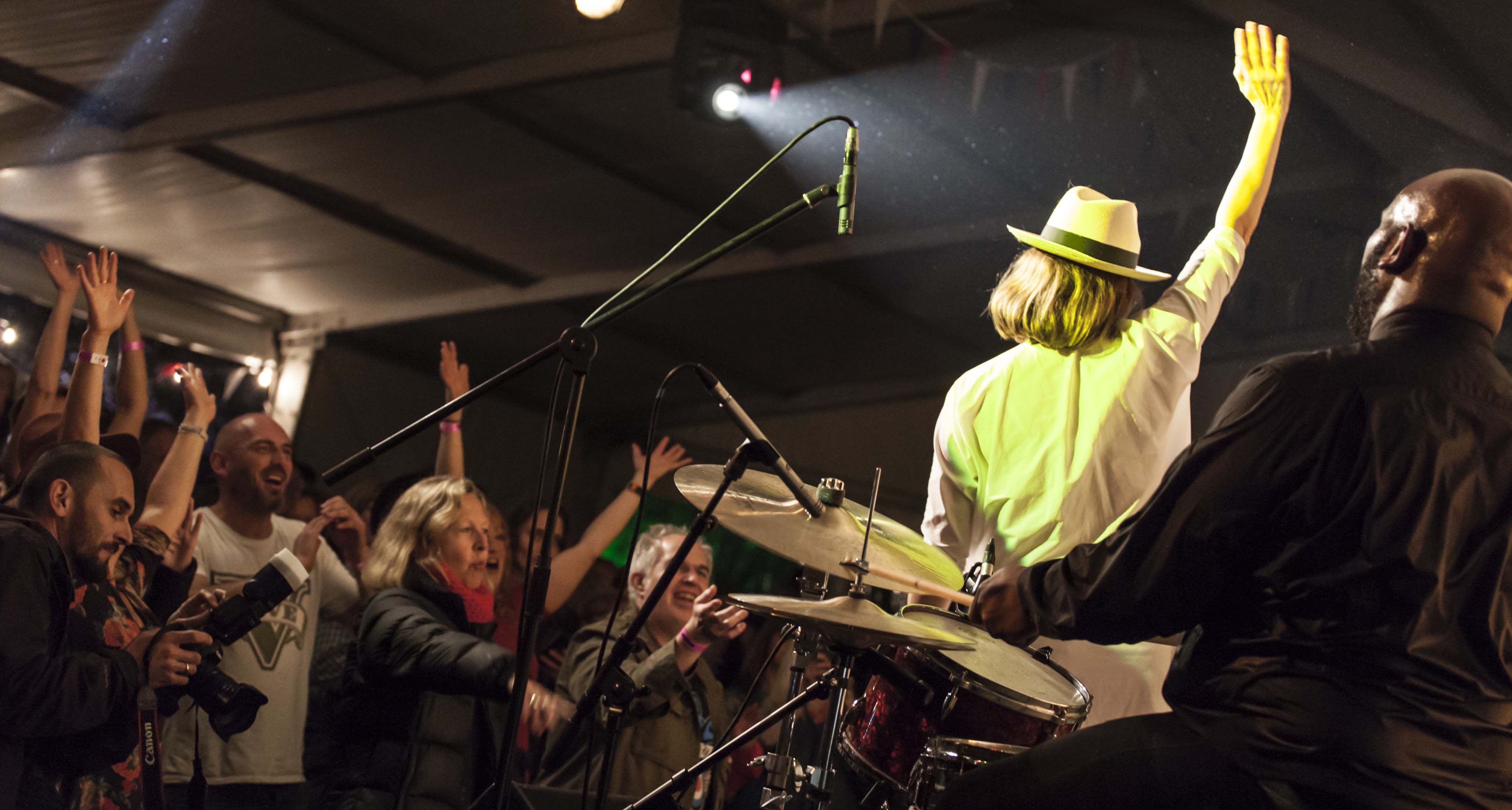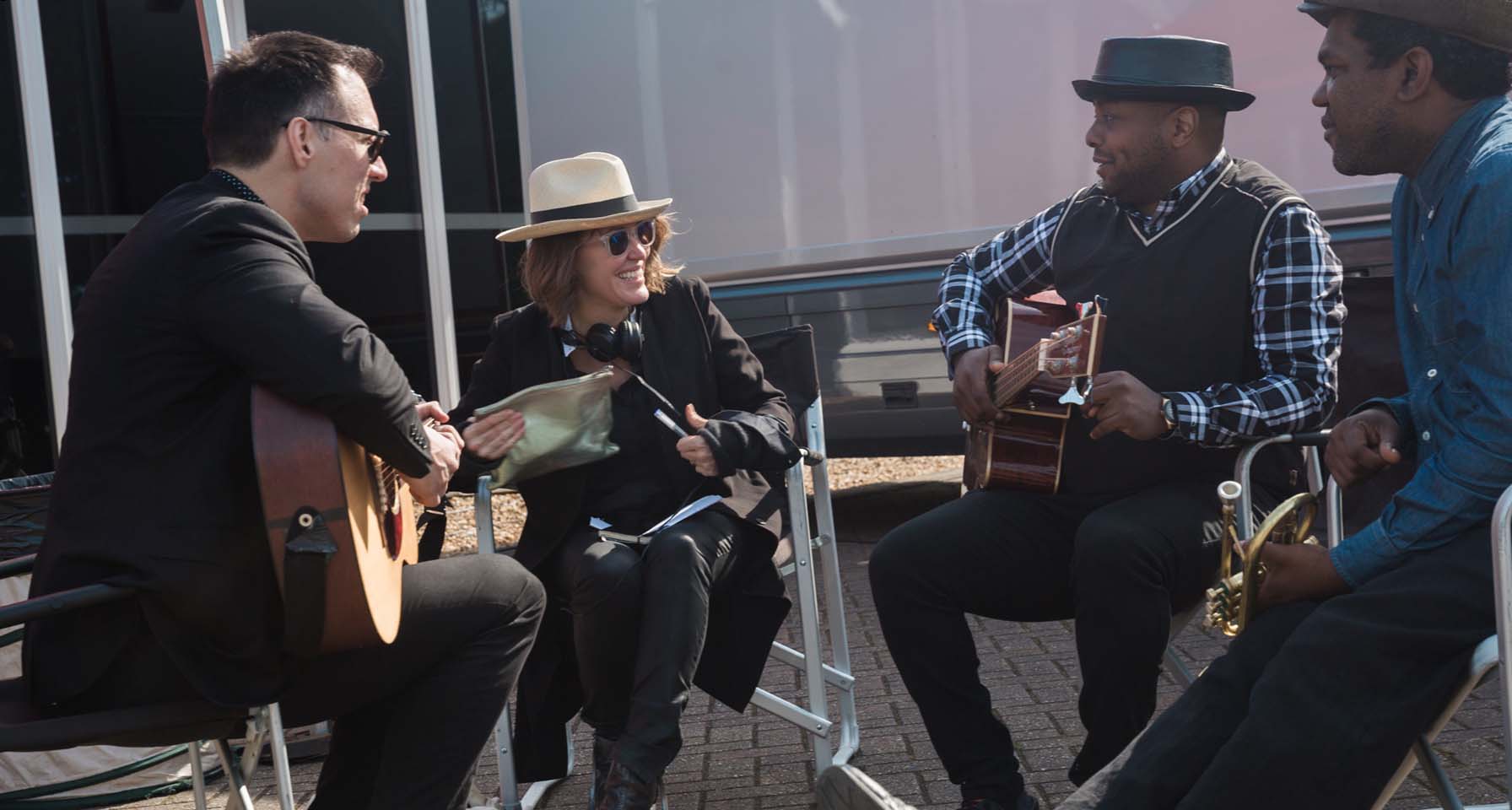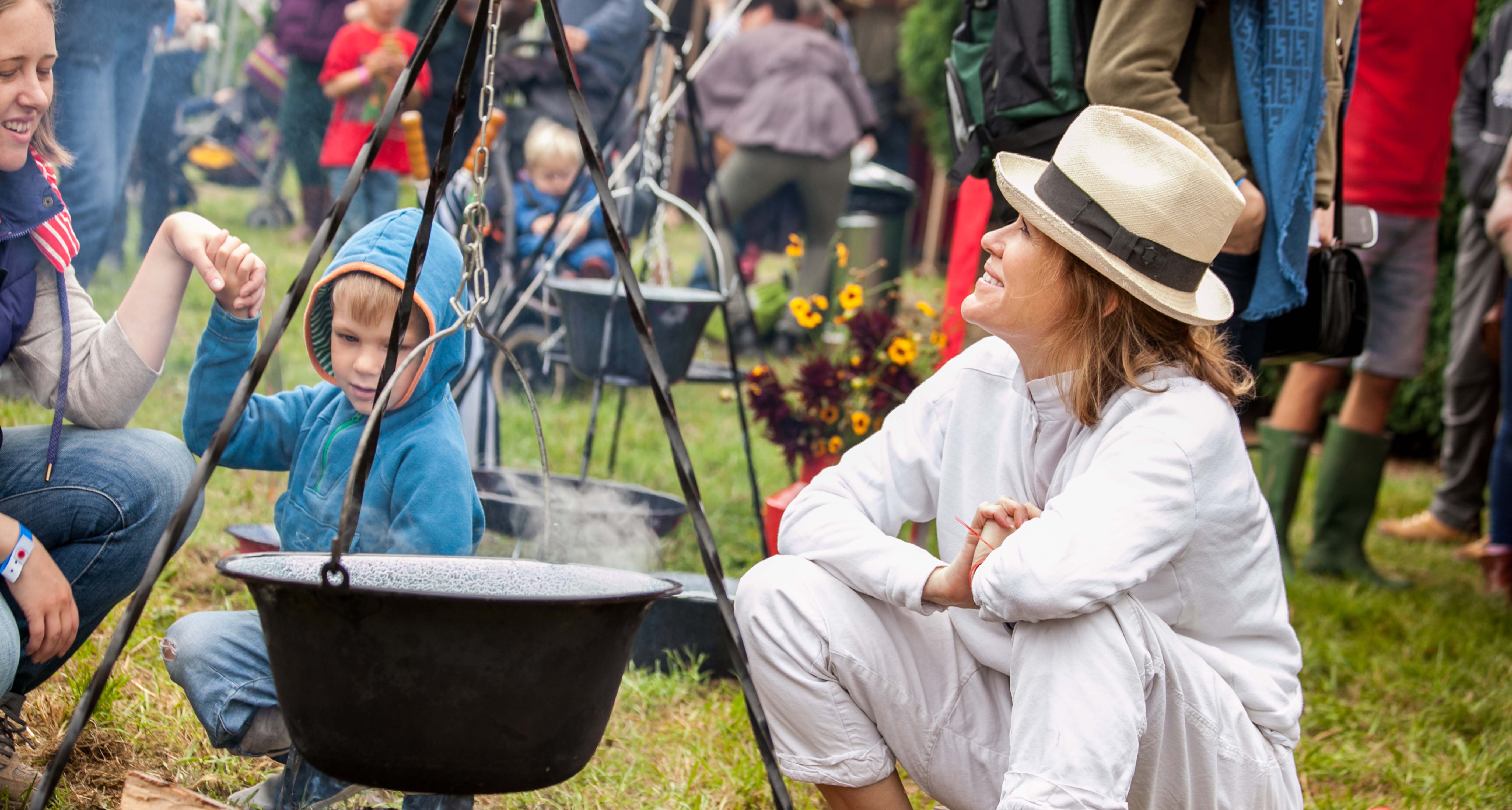‘I’M so in love that I can’t deny it’ - so goes a line from the traditional Irish folk song Peggy Gordon.
Made famous by The Dubliners it’s also the ballad that sealed the relationship between Cerys Matthews and her husband Steve Abbott, the Irish music producer and front man with Luton punk group UK Decay.
In some ways it also sums up the Welsh singer’s relationship with life itself.
As a creator of indie rock band Catatonia in the early 90s, Matthews is now a familiar voice on BBC Radio 6 Music, where her Sunday morning show covers an eclectic mix of live music from blues to poetry beats.
It’s a Tuesday when we meet on London’s Portobello Road.
It’s a grey day, the kind that threatens to spill with rain, when Matthews arrives on her mountain bike – though she’s keen to downgrade to something a little more leisurely with less off road capabilities, she says.
Fiercely proud of her Welsh heritage, Matthews has an affinity for Ireland that needs no biological back up.
Being married to a Donegal man is just the latest chapter in a long-standing love affair with the Emerald Isle.
“My family’s from Pembrokeshire, which is 50 miles from Rosslare, so we see Ireland you know...we feel the Irish wind,” she says.
“What clinched my relationship with my husband was Peggy Gordon, the song, he could not believe that I knew it.
"It’s one of my favourites but he was ‘why are you singing that?’,” she laughs. “And that was it.”
As well as her music and broadcasting jobs, Matthews is also the founder of The Good Life Experience – the Flintshire festival she set up three years ago with husband Steve as well as Caroline and Charlie Gladstone, the great, great grandson of former Prime Minster William Gladstone.
It takes place mid-September and has, on top of the usual line up of music, literature and food, a huge impetus on reconnecting with the outside world from axe throwing to tree climbing, bow and arrow making to blacksmith crafts.
“We’ve added the great outdoors,” Matthews says. “Because so many of us, whatever age you are, we’re stuck indoors, we’re stuck behind screens. It’s offering a safe platform, a weekend where you can just get away, get your hands dirty.
“There’s a huge resurgence in the old traditional crafts,” she adds. “I think it’s a natural thing, to every action there’s a reaction.
"So as we move forward into the modern era and as technology continues to evolve and take a huge chunk of our attention, we hanker for the old ways, for respite, for an antidote.”
“The whole thing about moving through life... someone says ‘how do you see yourself in 10 years?’, my answer is more wrinkles, better read,” she says.
“I think that’s the one joke really...the more you can understand the world the less you can enjoy it. That’s the crying shame of it all, you start getting a grip on the bigger picture of it all and you’re gone, too bloody late.”
“I learned that lichen can be reinvigorated after being dead for 100 years, maybe the answer is in lichen,” she jokes.
Awarded an MBE in 2014, for some Matthew’s will always be the lucky lady who got up close and personal with that other Welsh treasure Tom Jones on the track Baby it’s Cold Outside.
But as well as being a musician Matthews is also an author, a columnist for British Airways and cultural reporter for The One Show. Last year she composed music for the National Theatre and has curated for the Tate Modern.
Yet she says she is neither driven nor defined by success.
“I think that success for an individual is a red herring, the important thing is what road you choose to take,” she says.
While some children might one harbour dreams of becoming astronauts or fire fighters, a young Matthews had an altogether less obvious goal in mind.
“When I was nine I wanted to be Bob Dylan. I drank whiskey and smoked cigarettes to try and lower my voice because I’ve always had a high voice but that didn’t work out,” she jokes.
“I never told anyone because I didn’t want them to laugh. It still sounds a bit daft doesn’t it,” she adds.
Though the desire to be or achieve outside the status quo becomes less surprising the more she describes her childhood.
“I kind of grew up a rebel so I’ve always questioned things and not just swallowed things. I’ve said ‘what is the value of that?’. There’s a very big difference. I got into trouble at school for asking too many questions.
“I got into trouble for saying I want to do woodwork not sewing. Why do I have to play rounders not football? In all the things that are now too slowly changing but at least in our society we’ve got a chance at them.”
The Good Life Experience will attract around 4,000 people between September 16-18 with acts such as Gilles Peterson, John Cooper Clarke, Dublin’s Booka Brass Band and Fanfare Ciocarlia (The Romanian 12-piece are Matthew’s favourite live band) joining chefs including Australian cook Bill Granger and Wahaca’s Thomasina Miers.
“The good life for me isn’t buying Louis Vuitton bags or Jimmy Choo heels and spending £800, or more now these days,” Matthews says.
“For me it’s good company, it’s the craic, great music that you’ve made. I’m not interested in materialistic stuff to be honest, I like history.”
Irish history ranks high. Aged around 10 she was given a book of Irish verse by a family friend.
“I thought this stuff is incredible. And straight after that...I realised the link to Bob Dylan’s work in the Irish repertoire and I was into Country blues as well.
"I thought it was more interesting. I loved the tunes and the lyrics better,” she says.
“Another thing I love about these old songs is that you sing them and you’re in the shoes of people who’ve gone before you and I like that feeling, it’s such a transient moment that we’re here and gone.
“There’s a song in the Welsh repertoire, the girl that was forever turned away, a classic folk song of the time.
"She had a love affair out of marriage, got pregnant, the lover left her, the father locked the door to the house and the song was her singing about laying her body on the riverbed, the fishes swim over my head.
“I Never Will Marry is the Irish equivalent so in all these different cultures you’re going to have different songs...but you don’t get that perspective on history from anything other than folk songs.
“You usually just get the academics, the male, the historian, the upper class, the military or the politicians’ perspective of history.”
WATCH: Cerys performing an arrangement of the traditional Irish folk song Galway Shawl and Catatonia hit Strange Glue...
Having first visited Ireland in her late teens where she was shocked by the military presence she witnessed in places like Belfast and Derry, she cherishes the likes of Gaoth Dobhair, Dublin and Dingle where she says, despite the rain, she had a great time doing Other Voices.
“One of the things I’m most proud of with everything I’ve ever done, and I’ve been quite jammy actually, was being invited to give a talk at the Bloomsday events at the National library of Ireland, that really is something I hold very special in my heart,” she says.
Brought up a Welsh Baptist, Matthews favourite song is Hozier’s Take Me To Church – something she did herself in 2012, when she converted to Catholicism.
“What attracted me was the community aspect and the ritual and the feeling that we’re in this together, we need to help each other and make sense of the things we can’t understand.
“If you can just unchain yourself from the shackles of the things that don’t make any sense at all, and the hypocrisy, there is a lot of goodness, the aim was good.
"There’ll always be births, there’ll always be engagements, it’s nice to have the ritual around that.”
She says religion and faith in a higher power are things she has been thinking about all her life.
“The world is a relay race from generation to generation, you pass the baton over and unless we all work together history keeps repeating itself in a tragic way.
"I think in order to understand the miracle of life in all its forms, it’s unfathomable.
"The only way you can make sense of it is to think that something happens and ultimately, to sanely walk every day of your life, you have to think there is a God somehow.
“The older I’m getting the more concerned I am with taking on the responsibility of my own life and trying to act that way.”





